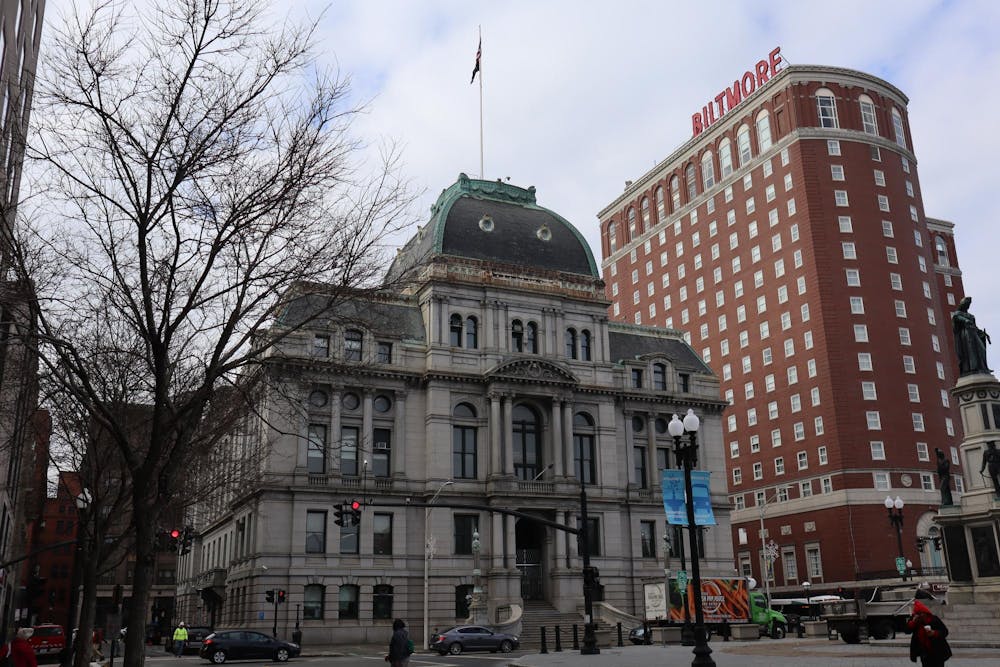On Monday, the Providence City Council hosted a public hearing for the Comprehensive Plan, a document that helps guide the city’s urban planning and development.
In their testimonies, residents mostly addressed the plan’s changes in housing, transportation and sustainability policies. The draft of the 2024 updated Comprehensive Plan also includes changes to land use, design standards, arts and cultural development, community spaces and public facilities.
Transportation
Providence resident Diane Librandi testified in support of a more extensive bus system, saying she relies heavily on the Rhode Island Public Transit Authority.
But last Tuesday, when Librandi tried to bus to her statewide primary elections polling location — which had been changed at the last minute — she realized that RIPTA does not service the area.
The current Comprehensive Plan draft hopes to increase bus ridership through more frequent and reliable service. While the plan “advocate(s) for new bus routes,” Librandi argued that the RIPTA must also ensure that more locations are accessible and connected.
Librandi also voiced her support for keeping the RIPTA bus hub in Kennedy Plaza rather than relocating it to a new area. She cited its centrality to the Providence downtown area as a main reason why it should stay as is.
Greg Gerritt, another resident who testified at the hearing, supported Librandi’s view and argued the money that would go into relocation should instead be used to improve existing transit infrastructure.
Housing and zoning
Liz Mauran, vice-president of the Mile of History Association, a nonprofit promoting preservation within the city, testified that creative solutions and strict design review are necessary for further development in Providence, noting vacant commercial spaces as possible options for adaptive reuse.
Mauran added that she hopes to see the return of historic tax credits and other incentives in housing developments to minimize the destruction of significant properties.
Fox Point Neighborhood Association President Lily Bogosian also stressed the importance of balancing historic preservation with development. She pointed to the strong opposition to development on Wickenden St. as an example, stating that its historic “funky, artistic vibe” attracts residents and visitors alike.
Bogosian said that Wickenden St. has been designated as a high density priority zone, “which places all these old buildings and its history … in serious jeopardy.” She added that to create more housing units, developers are turning multiple historic properties into large buildings with “nominal accommodations” from the city.
Bogosian asked the City Council to consider changing Wickenden’s designation back to a C2 zone — a community commercial zone — so that its history can be preserved.
Lucy Berman, a representative from Central Providence Opportunities, brought up equity concerns about current zoning practices. “With this plan, Providence has an opportunity to advance equitable zoning reforms so that we can be a city that develops deeply affordable housing without displacement,” they said.
Berman pointed to the comprehensive plans of Seattle and Minneapolis as examples of cities that have centered racial equity in their housing and zoning development policies.
“As it stands, this plan sees Providence falling behind,” they said. “It does not acknowledge how the built environment perpetuates racial disparities and does not propose a plan of action to ameliorate and prevent harm to communities of color.”
Sustainability
Gerritt said that he approved the draft’s solutions on issues of sustainability, but he also believed more changes are necessary. “If we are going to have an economy that works in this city, we have to focus on climate justice,” he said.
Gerritt added that while Providence has a myriad of industrial zones, “what we haven’t done is figure out how to protect the health and well-being of the people who live next to the industrial zones.”
Gerritt noted the prevalence of asthma in such areas due to high rates of pollution and lack of effective measures to manage environmental hazards. “We need … to make sure that the kids who live next to industrial zones don’t have asthma.”
Resident Steve Ahlquist echoed similar sentiments, arguing that environmental justice is key to addressing climate change.
“We need to empower communities to reject industries that poison their children,” Ahlquist said, pointing to how more affluent and politically engaged neighborhoods — such as the East Side — have more power to do so than neighborhoods near the Port, for example.
In his testimony, Ahlquist also called for “no more fossil fuel development of any kind in Providence.”
“The language around environmental justice and climate change in the Plan needs to be tightened” to prevent people and industries from exploiting any possible loopholes in its current phrasing, Ahlquist added. “I would like to see us do better.”
This plan is updated every 10 years. The City Plan Commission will approve the most recent draft on June 18. The State of R.I. will also review the plan before implementation.
Avani Ghosh is a Metro editor covering city and state politics. She is a junior from Ohio studying Health and Human Biology and International and Public Affairs. She is an avid earl grey enthusiast and can be found making tea in her free time.





